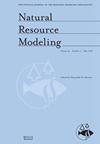Understanding the impact of selective fishery and bycatch on stock dynamics
IF 1.8
4区 环境科学与生态学
Q3 ENVIRONMENTAL SCIENCES
引用次数: 0
Abstract
Age/size selective fishery, which targets large individuals and retains immature individuals, is practiced worldwide. Yet, selective fishing can result in bycatch of undersized target species, posing a serious problem in stock management. In addition, there is a growing concern that intensive selective removal alters the composition of a population. Therefore, a comprehensive understanding of the effects of selective fishery on stock dynamics is essential for sustainable fishery management. In this study, an age‐structured model based on the Schaefer model assumptions was used to investigate the effects of selective fisheries and their bycatch on stock dynamics. Local stability analyses suggest that selective fishery can cause undesirable oscillatory stock dynamics in fishery management. Numerical simulations revealed that maximum sustainable yield‐based management with a large age at maturity is more likely to lead to stock oscillations. Notably, bycatch, which is detrimental to the sustainability of the fishery, was found to reduce the oscillatory dynamics. Overall, selective fisheries tend to cause oscillatory stock dynamics in various situations. Selective fishing also tends to reduce the critical fishing effort that causes stock extinction; therefore, a precautionary approach is necessary to mitigate such issues.Recommendations for Resource Managers Age/size selective fishing that retains immature individuals is practiced worldwide and often cause unwanted bycatch, thus requiring a solid understanding for successful management. Selective fishing can cause fluctuations in stock dynamics that are undesirable for sustainable fisheries. This situation may be more likely to occur when the minimum age for fishing is large. It may also occur in fisheries based on maximum sustainable yield. Precautionary management, such as the establishment of marine protected areas, is therefore required.了解选择性捕捞和副渔获物对种群动态的影响
全世界都在进行年龄/大小选择性捕捞,即以大型个体为目标,保留未成熟个体。然而,选择性捕捞会导致误捕尺寸过小的目标物种,给种群管理带来严重问题。此外,人们越来越担心密集的选择性捕捞会改变种群的组成。因此,全面了解选择性捕捞对种群动态的影响对可持续渔业管理至关重要。本研究采用基于 Schaefer 模型假设的年龄结构模型来研究选择性捕捞及其副渔获物对种群动态的影响。局部稳定性分析表明,在渔业管理中,选择性捕捞会导致不理想的种群振荡动态。数值模拟显示,基于最大持续产量的管理和大成熟年龄更有可能导致种群振荡。值得注意的是,对渔业可持续性不利的副渔获物被发现会减少振荡动态。总体而言,选择性捕捞在不同情况下往往会导致种群动态振荡。对资源管理者的建议全世界都在进行保留未成熟个体的年龄/大小选择性捕捞,这通常会造成不必要的副渔获物,因此需要对成功管理有扎实的了解。选择性捕捞会造成种群动态波动,这对可持续渔业是不可取的。当最小捕捞年龄较大时,这种情况更有可能发生。因此,需要进行预防性管理,如建立海洋保护区。
本文章由计算机程序翻译,如有差异,请以英文原文为准。
求助全文
约1分钟内获得全文
求助全文
来源期刊

Natural Resource Modeling
环境科学-环境科学
CiteScore
3.50
自引率
6.20%
发文量
28
审稿时长
>36 weeks
期刊介绍:
Natural Resource Modeling is an international journal devoted to mathematical modeling of natural resource systems. It reflects the conceptual and methodological core that is common to model building throughout disciplines including such fields as forestry, fisheries, economics and ecology. This core draws upon the analytical and methodological apparatus of mathematics, statistics, and scientific computing.
 求助内容:
求助内容: 应助结果提醒方式:
应助结果提醒方式:


